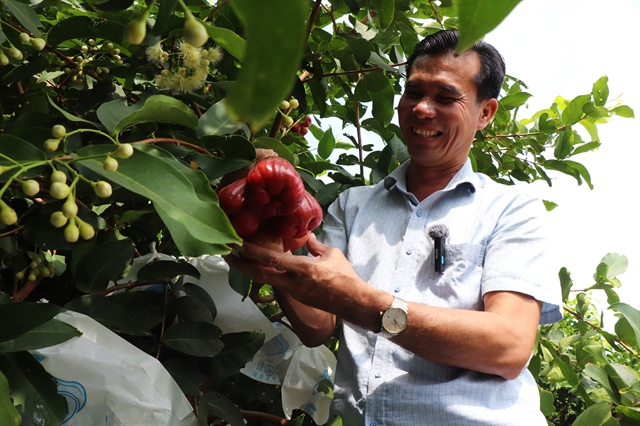 Society
Society


|
| A photo contest was organised as part of a Safety Delivered programme organised by AIP Foundation and The UPS Foundation. — Photo courtesy of the AIP Foundation |
HCM CITY – Although Việt Nam has maintained a high helmet wearing rate for years, sub-standard helmet use is still a problem, experts said on Wednesday at a forum held in HCM City.
A study on the quality of helmets used by people in HCM City and Thái Nguyên Province showed that 89.5 per cent of helmets worn were sub-standard helmets that fail to significantly reduce the chance of brain injury or skull fracture of their users in a road crash.
The study was conducted in partnership with the AIP Foundation and Hanoi University of Public Health through the Safety Delivered programme, supported by The UPS Foundation.
In the study, a total of 540 child and adult motorcycle helmets were collected and exchanged in HCM City and Thái Nguyên Province.
The study showed that 25.9 per cent of the surveyed helmets were identified as "cap helmets", which lack the foam lining needed to adequately protect wearers’ heads.
By law, these cap helmets do not meet the "satisfactory quality" requirements as stated in National Technical Regulation - QCVN2: 2008/BKHCN (National Technical Regulation on helmet for motorcyclists.)
Furthermore, the study found that only 10.5 per cent of helmets in a representative sample of collected helmets were able to pass impact absorption tests noted in the regulation.
Khuất Việt Hùng, executive vice chairman of the National Traffic Safety Committee, said: “The research findings show that poor-quality helmet usage leads to a higher risk of fatalities in road crashes.”
“Although the number of helmets tested is low, the research can still reveal the quality of helmets on market today. This raises a question on the effectiveness of our work on supervising and managing protective equipment,” Hùng added.
The research also serves as evidence for government agencies to further investigate and closely monitor policies to improve their work on the quality of motorcycle, bicycle and electric bike helmets in Việt Nam.
According to the Asia Injury Prevention (AIP) Foundation, evidence in nearly all countries proves that wearing a quality helmet can reduce the chance of death by 42 per cent and of serious injury by 69 per cent.
Poor quality helmets lack many of the critical components which play a role in saving the wearers’ life, such as the energy-absorbing foam lining that reduces the impact in a crash.
However, the easy accessibility and low cost of low-quality helmets, in combination with low road user awareness, can encourage individuals to opt for a sub-standard helmet over a quality helmet on the market, according to the AIP Foundation.
As mentioned in Decree No 4, “production, trading and use of helmets that do not meet national quality standards, fake helmets, and cap helmets are still an on-going and un-anticipated issues". This issue has caused difficulties in regulation and enforcement for government agencies.
Mirjam Sidik, CEO of AIP Foundation, said: “We must work together to ensure they have access to quality equipment on the market. Through our research and advocacy efforts, we aim to ensure that choosing quality helmets is the norm in Việt Nam, protecting vulnerable road users on every journey they take."
The mid-term review forum was organised by AIP Foundation and the National Traffic Safety Committee to implement the Prime Minister's Directive dated January 19, 2018 on solutions to improve the effectiveness of legal regulations on mandatory helmet wearing for motorbike drivers, motorcyclists, and electric bicyclists.
The forum discussed strategies to improve the use of quality helmets, with the support of national and local government representatives, road safety and public health experts, and private sector stakeholders, including helmet manufacturers in Việt Nam.
The achievements of the first half of the 2019-2020 Safety Delivered programme year was presented at the forum.
Safety Delivered has since 2011 expanded to address the issue of quality helmets, building upon a partnership between AIP Foundation and The UPS Foundation to increase child helmet use in Việt Nam.
Last year, Safety Delivered distributed 10,942 helmets and implemented educational road safety activities and awareness campaigns at primary schools in the programme.
As a result, helmet-wearing rates among students were observed to have increased from 23 per cent to 77 per cent at seven primary schools in HCM City and from 27 per cent to 82 per cent at 11 primary schools in Thái Nguyên Province. VNS




